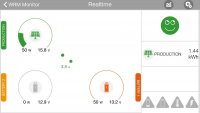Toothlessjon
Lifetime VIP Member
I have been considering installing 100 or 200 watts of solar on the Ocean. We will probably only use the Ocean in the UK for the first year.
My question is ‘it usable in the UK” ? I would be happy if it managed to keep the leisure batteries topped up (with a single 100Watt panel) whilst not being used tbh. We live in Hertfordshire, so weather is typically brighter than the North of the UK.
My question is ‘it usable in the UK” ? I would be happy if it managed to keep the leisure batteries topped up (with a single 100Watt panel) whilst not being used tbh. We live in Hertfordshire, so weather is typically brighter than the North of the UK.


















